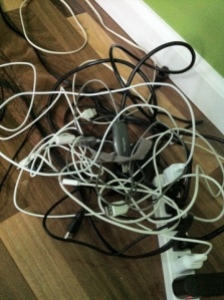Have you ever been working really hard on something, and have someone who sees you working say to you at the peak of your frenzy, “You know, no one ever said on their death-bed that they wished they spent more time at work”? That may be true, but will anyone ever say on their death-bed, “I wish I had spent more time on Facebook”?
I have a ritual before I sign on to the Big FB. I say to myself, “Now, we’re just going in for three things: Wish happy birthday to absolutely anyone whose birthday prompt arises, re-poke any pokers, and RSVP to your brother-in-law’s ‘Second Annual Weekend at the Chicken Farm,’ and that is it. Got it? All right, we’re going in…”
But the moment I sign in my plan goes out the Microsoft Windows. I am grabbed, wrapped up in Facebook’s tentacles, entranced by the songs of its sirens. There’s no way to stop it. One moment I’m checking out the birthday quadrant, and the next moment I’m looking at ultrasounds of someone’s deviated septum. I retrace my steps, and I see how I went astray:
“All right, I signed in, and saw that it was so-and-so’s birthday, but there were those pictures of such-and-such’s new baby, and so I had to look at those pictures, and right underneath that update was an update from so-and-so about how he scored tickets to see Hall & Oates, and then, I saw that 43 of my other friends are fans of Hall & Oates, and one of their profiles I didn’t recognize, so I clicked on it and found that it was a complete stranger, but after looking at her other profile pictures I discovered that she is someone who I went to high school with, but has remarried, and so I check on her husband’s page, even though I don’t know him, and what do you know he likes a certain band, which is cool, even though I’ve never heard of that band. So I clicked on the link of some dude who commented on a photo of the husband of that girl I went to high school with….”
The recursion is maddening. I’m not sure if recursion is the correct word to use, but the point is I can’t retrace my steps. I get disgusted with myself and sign off Facebook in a huff. And then two minutes later I realized that I forgot to do on Facebook what I had initially meant to do. So I sign back on, and the cycle of wasted time and self-disgust begins anew.
I’ve heard reports that the average Facebook user spends six hours a day on Facebook. If you could put time in a bottle, how many bottles would that be, worldwide? Does it make a difference if you use plastic bottles? It certainly does if you’re an environmentalist. But most non-environmentalists only care that the bottle not contain any BPA, whatever that is.
Six hours a day for every person on Facebook. This cannot be as disheartening as it sounds. Perhaps many Facebook users live in places where there is not that much to do, and going on Facebook actually increases the productivity of their regional economy. But for most people, I imagine, Facebook is taking time that could be put to far more productive use, like helping in the community, spending time with family, or writing a blog.
Maybe companies will figure out a way to have employees do their work on Facebook. I’ve alluded before to the possibility of suing people on Facebook. Perhaps meetings and projects could be done with fan pages. Products could be ordered and memos sent. Even those little office birthday parties…well, we know Facebook has got the birthday thing down.
But what would those people who work on Facebook do to waste time? They could not very well waste time on Facebook, because Facebook would be their job. By definition, you can’t waste time at work by working. The Facebook workers would have to sign off, and turn off the monitor or shut the laptop, and pick up a stack of paper, and start filing.
And at 5 o’clock, the Facebook workers would put on their coats and hats, and go to a cafe, where they would meet real people, and talk face to face. They would sip their coffee and nod, and smile, and make all of the tones and gestures that give spoken language its vitality. And after they drain their cups, and catch-up on each others’ lives, these Facebook workers would sit back and reminisce about the days when people socialized over Facebook.
Do you stick to the grocery list when shopping at Facebook? Or do you find yourself wandering the aisles as time ceases to exist?







